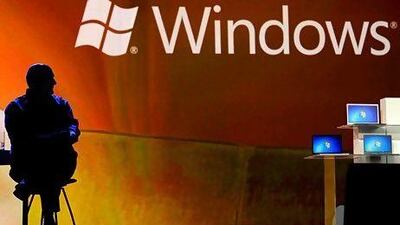Like the American writer Mark Twain, Microsoft can once again say that the rumours of its death have been exaggerated.
Silicon Valley industry watchers trialling a prototype version of Windows 8, Microsoft's new operating system, are giving it the thumbs down.
There are dire predictions that when Windows 8 becomes available this year, the once-mighty Microsoft will crash and burn in the era of smartphones and tablet computers such as the Apple iPad. In trying to produce software that can run equally well on desktop personal computers, tablets and smartphones, the company may have fallen between three stools.
Even those research firms that acknowledge Windows 8 to be a creditable upgrade to Windows 7 and Windows NT believe that Microsoft has some tough challenges ahead.
The international research firm Forrester is "bullish" about Windows 8. But, according to Sarah Rotman Epps, an analyst for Forrester: "Since the iPad launched, the market has shifted in several ways that should raise alarms for Microsoft's product strategists."
She describes Microsoft as "a fifth mover" in tablet computing, coming not only after the iPad tablet but also after Android tablets such as the Samsung Galaxy Tab, HP's now defunct webOS tablet and BlackBerry's PlayBook.
"Apple, Samsung and others have already launched second-generation products and will likely be into their third generation by the time Windows 8 launches," the Forrester analyst JP Gownder wrote in a blog post.
The danger for Microsoft is that many of its former customers will have already migrated to and become used to rival companies' products. For example, Apple's QuickOffice, a new rival to Microsoft Office, which has been the workplace standard for many years, is now the fourth-highest grossing Apple application (app) across all categories. Other Apple business apps such as Salesforce Mobile for iPad are also spurring corporate adoption of the iPad.
Doom watchers point to this encroachment on Microsoft's traditional dominance as irrefutable evidence of the software giant's imminent demise. But Microsoft has been down this road before and has often excelled at playing catch-up.
"Windows has long been a fast follower par excellence. Apple launched the graphical user interface … for a mass market with the Mac, but Microsoft perfected it in Windows," says Ms Rotman Epps.
Some industry watchers also believe that tablet computing does not yet present as great a threat to Microsoft's core business as some Silicon Valley commentators believe.
"There are some real opportunities for Microsoft and its hardware partners later this year," according to Richard Edwards, an analyst at the research company Ovum."The vast majority of corporate users still don't use a tablet computer like the iPad, and those that do are still left wanting more from their tablet when they are away from their desktop or laptop computer."
He adds: "The PC still has a lot of mileage in the workplace and Ovum believes that Microsoft's new upgrade to the Windows operating system reflects this."
Other experts agreed that Microsoft should not be dismissed.
"With Windows 8, Microsoft is moving closer to Apple's model, including launching its own App store," said Tim Coulling, an analyst at the research firm Canalys."With the market still in its infancy and vendors on Android struggling to take share from Apple, it is too early to write off Microsoft. For Windows 8, application availability and product pricing will be key."
Microsoft is not only following in Apple's footsteps by producing an operating system for tablet computers and a Windows Store for off-the-shelf apps, it is also trailblazing products that are still in the pipeline with the introduction of Windows 8 and its new screen interface Metro.
"In addition to being designed for tablets and smartphones, the new Windows interface - Metro - is also being developed for the new generation of system-on-a-chip devices," says Mr Edwards. These include tablet computers with novel features such as fold-away keyboards and built-in Kinect motion sensors."
But Microsoft has had difficulty in making any inroads into the smartphone market. With a mushrooming proportion of the world's computer users relying on their smartphones, this is a market Microsoft cannot afford to ignore. But so far, the software maker's smartphone success has been limited. Its previous attempt, Windows Phone 7, made little impact on the market leaders.
"Microsoft's deals with Nokia and Samsung to manufacture Windows Phone handsets will increase visibility for the platform, but as of today, the phone is a lost opportunity to build consumer anticipation for Windows 8," according to Ms Rotman Epps.
"Windows Phone is a great product, but too few people are buying it … It offers no launch pad for Windows 8."
But Microsoft has always be a long-term strategist, ever since the young Bill Gates had the then-undisputed world computing leader IBM in his sights. According to Forrester's research, manufacturers such as Dell, Hewlett-Packard, Lenovo and Samsung are already moving towards the adoption of Windows 8 to reinforce long-term partnerships with Microsoft to take on Apple.
twitter: Follow our breaking business news and retweet to your followers. Follow us

